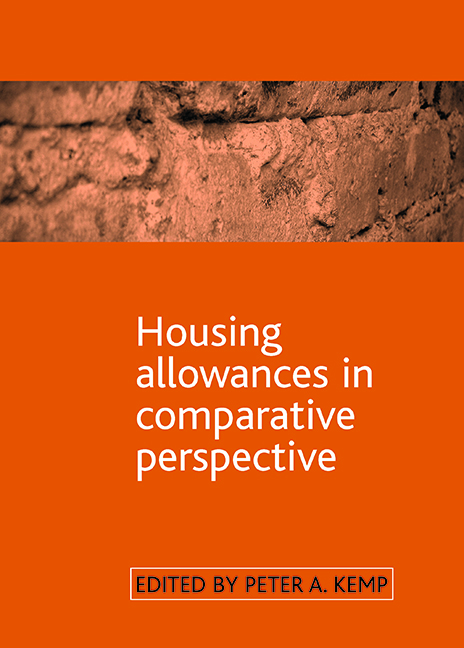Book contents
- Frontmatter
- Contents
- List of tables and figures
- Acknowledgements
- Notes on contributors
- one Housing allowances in context
- two Housing allowances and the restructuring of the Australian welfare state
- three The New Zealand experience of housing allowances
- four Canadian housing allowances
- five Housing allowances American style: the Housing Choice Voucher programme
- six Housing Benefit in Britain: a troubled history and uncertain future
- seven Housing allowances in France
- eight Housing allowances in Germany
- nine Housing allowances in the Netherlands: the struggle for budgetary controllability
- ten Housing allowance systems in Sweden
- eleven Housing allowances in the Czech Republic in comparative perspective
- twelve Housing allowances in the advanced welfare states
- Index
four - Canadian housing allowances
Published online by Cambridge University Press: 15 September 2022
- Frontmatter
- Contents
- List of tables and figures
- Acknowledgements
- Notes on contributors
- one Housing allowances in context
- two Housing allowances and the restructuring of the Australian welfare state
- three The New Zealand experience of housing allowances
- four Canadian housing allowances
- five Housing allowances American style: the Housing Choice Voucher programme
- six Housing Benefit in Britain: a troubled history and uncertain future
- seven Housing allowances in France
- eight Housing allowances in Germany
- nine Housing allowances in the Netherlands: the struggle for budgetary controllability
- ten Housing allowance systems in Sweden
- eleven Housing allowances in the Czech Republic in comparative perspective
- twelve Housing allowances in the advanced welfare states
- Index
Summary
Introduction
Housing allowances in Canada are offered by only four provinces. The absence of a national allowance should not be too surprising in a country where there is really no such thing as national policy for low-income housing. Instead there is a set of housing policies, one for each province. This has been especially true since the federal government all but vacated this area in the 1990s. It first terminated all programmes for building new social housing, as low- and mixed-income housing is called in Canada. Then it transferred the management of most existing subsidy commitments to the provinces. Even in the 1960s to the early 1980s when the federal government took an activist role, low-income housing in any province was only built if a province accepted the federal offer of funds and joined as a partner. This is in line with the fact that housing is constitutionally the responsibility of the provinces – a quite different situation from that of the US states relative to their federal government – and Quebec, especially, has been sensitive to this.
The Canadian provinces have differed in their take-up of federal offers. In part this is because they have widely varying housing markets. For example, some like Ontario, Alberta and British Columbia (BC) have high-rent and high-cost cities and others such as Newfoundland, Quebec and Manitoba have not. They also have varying views of their own needs and the role of governments, with, for example, Alberta generally favouring a highly restricted role, Quebec an interventionist one and other provinces, such as Ontario, a more mixed role. But all the provinces, with the notable exception of oil-rich Alberta, have less revenue-raising capacity than the federal government, despite their constitutional responsibilities. The provinces also have attached less importance than the federal government to new construction, quite naturally in view of the latter's responsibility for the macro-economy and the role of house building in maintaining full employment.
It is not too surprising in this context that some provinces have introduced housing allowances, which are cheap programmes involving no new building, although they have received no federal support. Ironically, these programmes are targeted squarely at solving a lack of housing affordability, the problem which the federal government's housing agency, Canada Mortgage and Housing Corporation (CMHC), has identified as the overwhelmingly most important housing problem.
- Type
- Chapter
- Information
- Housing Allowances in Comparative Perspective , pp. 61 - 86Publisher: Bristol University PressPrint publication year: 2007



